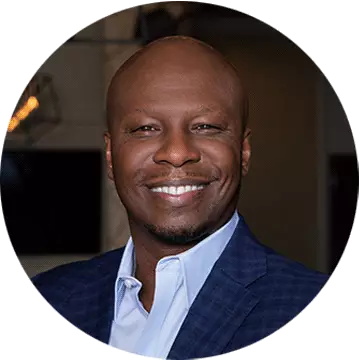4 lessons I learned while acquiring power and influence in my career

Written by╠²Dr. Patrick C. Horton

If, after 20-plus years in the IT industry, I could give you one piece of advice for acquiring power and influence in your career, itŌĆÖs this: Never turn down an opportunity!
Now, there are other goals in life besides leadership, and if any of those are driving your career, you may well find yourself in a position where it makes sense to decline an opportunity, be it a promotion or a way to take on more responsibility in your current role. My experience is not a one-size-fits-all, nor is it career advice.
The purpose of this article is to reflect on my career experience and cull from it the nuggets of wisdom that may, in one capacity or another, benefit someone else. My journey isnŌĆÖt exactly typical, but it may offer insight into opportunities and strategies that other people can make their own, no matter what industry or career path they choose.
1.╠² Embrace opportunity
are typically defined as the ability to make people act based on your authority and to persuade others to follow your lead. Different careers offer different levels and types of power and influence, depending on such factors as industry, organization and role.
Early in my career, I was faced with a pivotal decision that would shape the rest of my professional life. It was November 2011, and I was informed that my boss was being let go. His job ŌĆö serving as the country manager of a 50-person combat-zone program in Afghanistan ŌĆö was on offer.
If I accepted, I would be responsible for making decisions that affected the safety and lives of my contractor employees who installed free satellite systems for troops. If I declined, IŌĆÖd save myself the stress but deny myself the opportunity.
I said yes, I would be honored to be the country manager. But I also mentioned there was another candidate to consider: a previous deputy country manager. I didnŌĆÖt want to step on any toes.
The executive informed me that he had approached the other manager about the role, too, and the manager had said he didnŌĆÖt know if he wanted the extra stress and responsibility. This was an immediate turnoff for the executive who was looking for a leader. He wanted someone who was all in.
This was a different time and place, and while power grabs are not necessarily something IŌĆÖd endorse, I did learn a valuable lesson. You canŌĆÖt wait for opportunity, power and influence to come to you. (But if they do come your way, donŌĆÖt waver.) Take ownership of your destiny and show initiative: Let your leadership know your goals, so that if a spot opens up, you are the first person who comes to mind.╠²
I can't tell you how many qualified people I know who have the attitude of, ŌĆ£If they want to give me the position, IŌĆÖll let them ask me.ŌĆØ This is not a healthy attitude to have. People arenŌĆÖt mind readers, nor should they be. Instead:
1.╠²╠²╠² Communicate to management that youŌĆÖre╠²interested in advancement╠²and work together to identify opportunities for professional development and growth.╠²
2.╠²╠²╠² Demonstrate your desire by╠²improving yourself╠²through further education, certification and experience to position yourself for those opportunities.
If you broaden your knowledge base and skill set, you can confidently raise your hand and compete when the time comes.
2.╠² Get foundational experience and credentials
The secret to how this no-name former Army private grew to become a vice president of program management, a college professor, a member of and a knowledge-commerce entrepreneur can be summed up in three professional categories: education, certification and experience.
Acquiring power and influence in a corporate setting requires strategic career-building tactics to help you enhance your credibility and reputation, and command authority in your industry.╠²╠²
Maximizing education, certification and experience locks in the foundation for a╠²strong personal brand. This includes:
- Identifying key career positions, even if theyŌĆÖre not leadership roles per se, that impart the right skills and experience for a leadership role down the road.
- Pursuing credentials, including certifications, that give you industry-specific knowledge.
- Obtaining the education necessary for the position you want.
- Exploiting any advantageous workplace assets you have that your competition doesnŌĆÖt.
All of this requires you to have a clear understanding of the goals, professional strengths and values that support your brand of influence and power. These include the skills you alone bring to the table, your ability to collaborate and your ability to communicate your vision to peers, subordinates and leadership.
Ultimately, your personal brand should have its own flavor but be underpinned by such qualities as innovation, dependability, professionalism and competency.
╠²
How this looks in my career
Wondering what all this looks like in real life? My own career can serve as an example.
Experience
For the last 20 years, IŌĆÖve been promoted or made a lateral move every two years, and IŌĆÖve never turned down a promotion.
After my military experience from 2000 to 2006 (when I held several positions in several countries), my career trajectory looks like this:
- Satellite systems technician to a network analyst (2006-2009)
- Satellite systems engineer to project manager to program manager (2009-2018)
- Director of Department of Defense programs to vice president of program management (2018-present)
Instead of working one or two functional positions over a 20-year period, I was able to traverse different organizations, work in different functional departments, gain exposure to different technologies and organizational structures, strategically network with executives and personnel from various organizations, and diversify my skill set more than 10 times over. This is how I used experience to acquire influence and power.
Additionally, because I have held so many executive positions for different organizations with different objectives in the same industry, I have been able to build relationships with key players and leverage those in each of my roles.╠²
Education
My education served the dual purpose of teaching me essential information and empowering me to meet certain labor category requirements for career enhancement. To that end, I pursued the following degrees:
- Associate of Science in Computer Science, Heald College
- Bachelor of Science in Information Technology╠²(BSIT), ░«╬█┤½├Į
- Master of Business Administration╠²(MBA), ░«╬█┤½├Į
- Doctor of Management in Organizational Leadership with a specialization in Information Systems and Technology╠²(DM/IST), ░«╬█┤½├Į
Certifications
Investing in your professional development is key to acquiring power and influence. You must continually pursue opportunities to expand your knowledge, learn new and relevant skills, and gain exposure to new technologies and workflow processes. Certifications may be one way to accomplish that.
Throughout my career, I have held at least 10 major industry certifications, which not only allowed me to meet labor category requirements for global career opportunities but also offered me significant networking opportunities.╠²╠²
3.╠² Manage stakeholder relationship and influence
One strategy for acquiring influence and power is to create professional relationships with key leaders, decision-makers and partners across your organization and industry. Ideally, youŌĆÖd connect with individuals who have the ability to create business project opportunities for your organization and╠²career advancement opportunities╠²for you personally.
In my experience, leaders often hire and promote people they like and who share their interests. ThatŌĆÖs why itŌĆÖs so important to build connections and visibility within your industry. It can lead to collaboration, idea exchanges, knowledge sharing and, yes, opportunities.
4.╠² Build and leverage influence ethically
If you are the president of a large organization, you likely have great power and influence regarding the strategic direction your company takes. You have the ability to make high-level decisions that include employee compensation, status and recognition.
That can all feel great, but having power and influence comes with important ethical considerations as well. You may be under increased pressure to pursue profitability and push the boundaries of work-life balance for you and your employees, but youŌĆÖll also shoulder the responsibility to push back against that pressure when necessary.
Leveraging power and influence is largely predicated on the individualŌĆÖs ability to harness it, the ethical values they maintain, and the goals they seek to accomplish. Leaders with influence and power should always weigh the outcomes of their actions against the cost of their choices.
In the end, power and influence need to be rooted in integrity. Only then do leaders become worthy of respect and positioned to increase their influence even further.
The views expressed in this article are those of the author and do not necessarily reflect the opinions or beliefs of ░«╬█┤½├Į. Dr. HortonŌĆÖs experience may not be typical for all ░«╬█┤½├Į students and alumni.╠²
ABOUT THE AUTHOR
Dr. Patrick C. Horton, MBA, DM/IST, is the vice president of program management for Tampa Microwave, a college professor and a veteran U.S. Army sergeant. He earned his Bachelor of Science in Information Technology, Master of Business Administration and Doctor of Management with a specialization in Information Systems at ░«╬█┤½├Į. He launched his business, Professional Career Transformations, in 2021 as a way to guide and encourage others to identify and pursue their career goals. He is a former member of Vistage Executive Coaching Group and a recipient of the Purple Heart in Operation Iraqi Freedom, and he lives in sunny Florida. Learn more about Dr. Horton and his commitment to helping others achieve their highest level of success by and be sure to watch this on his YouTube channel.╠²
This article has been vetted by ░«╬█┤½├Į's editorial advisory committee.╠²
Read more about our editorial process.
Read more articles like this:


